
Foot surgery can address various conditions to relieve pain and improve function. Bunion surgery is performed to correct the deformity of the big toe joint, often involving realignment of the bones. Fusion surgery, typically for severe arthritis, involves joining two or more bones in the foot to reduce pain and stabilize the joint. Hammertoe surgery corrects the abnormal bending of the toes, which can cause discomfort and difficulty walking. Heel surgery addresses issues such as chronic pain or deformities, often involving procedures to repair or realign the heel bone. Additionally, neuroma surgery is used to remove or reduce the swelling of a nerve, usually between the toes, to alleviate pain and discomfort. Each type of surgery aims to address specific foot problems and improve overall mobility and quality of life. If you have a foot condition that may require surgery for relief, it is suggested that you consult a podiatrist who can determine if this is a right choice for you.
Foot surgery is sometimes necessary to treat a foot ailment. To learn more, contact one of our podiatrists of Lovely Foot Associates, PC. Our doctors will assist you with all of your foot and ankle needs.
When Is Surgery Necessary?
Foot and ankle surgery is generally reserved for cases in which less invasive, conservative procedures have failed to alleviate the problem. Some of the cases in which surgery may be necessary include:
What Types of Surgery Are There?
The type of surgery you receive will depend on the nature of the problem you have. Some of the possible surgeries include:
Benefits of Surgery
Although surgery is usually a last resort, it can provide more complete pain relief compared to non-surgical methods and may allow you to finally resume full activity.
Surgical techniques have also become increasingly sophisticated. Techniques like endoscopic surgery allow for smaller incisions and faster recovery times.
If you have any questions please feel free to contact our office located in Johnstown, PA . We offer the newest diagnostic and treatment technologies for all your foot and ankle needs.
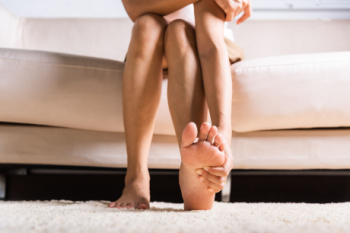
Foot pain and swelling can result from various factors, ranging from temporary to serious. Non-serious causes can include prolonged standing, overuse, wearing poorly fitting shoes, or minor injuries. Such pain can resolve with rest, elevation, and proper footwear. However, more serious causes demand attention. Conditions like arthritis, tendonitis, and plantar fasciitis cause persistent pain and swelling, requiring podiatric intervention. Infections, blood clots, or fractures also necessitate prompt evaluation. If foot pain and swelling persist beyond a few days, worsen, or are accompanied by other symptoms such as redness, warmth, or fever, it is strongly suggested that you schedule an appointment with a podiatrist for an accurate diagnosis and a tailored treatment plan.
Foot Pain
Foot pain can be extremely painful and debilitating. If you have a foot pain, consult with one of our podiatrists from Lovely Foot Associates, PC. Our doctors will assess your condition and provide you with quality foot and ankle treatment.
Causes
Foot pain is a very broad condition that could be caused by one or more ailments. The most common include:
Diagnosis
To figure out the cause of foot pain, podiatrists utilize several different methods. This can range from simple visual inspections and sensation tests to X-rays and MRI scans. Prior medical history, family medical history, and any recent physical traumatic events will all be taken into consideration for a proper diagnosis.
Treatment
Treatment depends upon the cause of the foot pain. Whether it is resting, staying off the foot, or having surgery; podiatrists have a number of treatment options available for foot pain.
If you have any questions, please feel free to contact our office located in Johnstown, PA . We offer the newest diagnostic and treatment technologies for all your foot care needs.
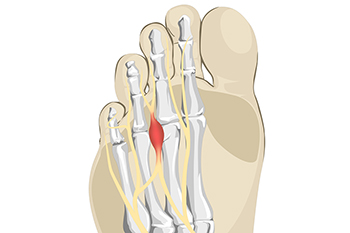
One common cause of foot pain is Morton’s neuroma, a thickening of the nerve tissue between the toes. This condition usually affects the space between the third and fourth toes, causing symptoms such as burning pain, tingling, numbness, and a strange sensation like walking on a pebble. Pain is often worsened by wearing shoes that are too tight or have high heels. Morton’s neuroma can be diagnosed through medical history and physical examination. In some cases, imaging studies may be needed to rule out other causes of foot pain. Treatment often includes resting the foot, wearing orthotics, and taking medications to reduce pain. In many cases, surgical intervention is needed. If you have symptoms of Morton’s neuroma, it is suggested you make an appointment with a podiatrist for care and treatment options.
Morton’s neuroma is a very uncomfortable condition to live with. If you think you have Morton’s neuroma, contact one of our podiatrists of Lovely Foot Associates, PC. Our doctors will attend to all of your foot care needs and answer any of your related questions.
Morton’s Neuroma
Morton's neuroma is a painful foot condition that commonly affects the areas between the second and third or third and fourth toe, although other areas of the foot are also susceptible. Morton’s neuroma is caused by an inflamed nerve in the foot that is being squeezed and aggravated by surrounding bones.
What Increases the Chances of Having Morton’s Neuroma?
Morton’s neuroma is a very treatable condition. Orthotics and shoe inserts can often be used to alleviate the pain on the forefront of the feet. In more severe cases, corticosteroids can also be prescribed. In order to figure out the best treatment for your neuroma, it’s recommended to seek the care of a podiatrist who can diagnose your condition and provide different treatment options.
If you have any questions, please feel free to contact our office located in Johnstown, PA . We offer the newest diagnostic and treatment technologies for all your foot care needs.
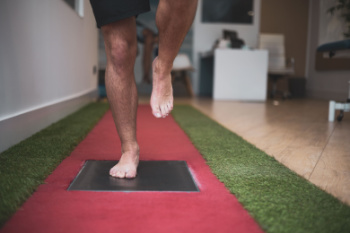
Running, a fundamental form of exercise, exerts significant demands on our bodies, particularly on the intricate structures of our feet. As a runner pounds the pavement or tread trails, each step engages a complex interplay of muscles and bones. The repetitive motion of running strengthens the intrinsic muscles of the foot, essential for stability and balance. Additionally, the bones of the foot, such as the metatarsals and phalanges, adapt to the stress of impact by becoming denser and more resilient over time. However, this activity is not without risks. Running can also lead to overuse injuries, affecting tendons and ligaments. Wearing proper footwear and gradual progression in intensity are vital to reduce these risks and maintain foot health. If you have endured a foot injury while running or jogging, it is suggested that you consult a podiatrist who can treat various foot conditions and educate you on how to protect your feet while running.
If you have any concerns about your feet, contact one of our podiatrists from Lovely Foot Associates, PC. Our doctors can provide the care you need to keep you pain-free and on your feet.
Biomechanics in Podiatry
Podiatric biomechanics is a particular sector of specialty podiatry with licensed practitioners who are trained to diagnose and treat conditions affecting the foot, ankle and lower leg. Biomechanics deals with the forces that act against the body, causing an interference with the biological structures. It focuses on the movement of the ankle, the foot and the forces that interact with them.
A History of Biomechanics
Modern technological improvements are based on past theories and therapeutic processes that provide a better understanding of podiatric concepts for biomechanics. Computers can provide accurate information about the forces and patterns of the feet and lower legs.
Understanding biomechanics of the feet can help improve and eliminate pain, stopping further stress to the foot.
If you have any questions please feel free to contact our office located in Johnstown, PA . We offer the newest diagnostic and treatment technologies for all your foot and ankle needs.
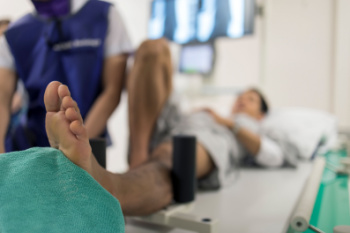
Foot stress fractures, also known as hairline fractures, are small cracks in the bones of the foot caused by repetitive stress or overuse. These fractures commonly occur in weight-bearing bones, particularly affecting athletes and individuals engaged in high-impact activities like running, jumping, gymnastics, and dancing. The second and third metatarsal bones are most susceptible to stress fractures due to the significant pounding they endure during these movements. Symptoms of a foot stress fracture can include localized pain that intensifies with weight-bearing activities, tenderness, and sometimes swelling. The pain may subside with rest but typically returns when activity resumes. Risk factors can include sudden changes in physical activity, abnormal foot structure, low levels of vitamin D and calcium, osteoporosis, and prolonged use of corticosteroids. Women with irregular menstrual cycles are also at increased risk. A podiatrist can conduct a thorough examination, including X-rays or other digital imaging tests, to pinpoint the fracture's location and severity. If you are experiencing foot pain after exercise, it is suggested that you schedule an appointment with a podiatrist for an exam and treatment options.
Stress fractures occur when there is a tiny crack within a bone. To learn more, contact one of our podiatrists from Lovely Foot Associates, PC. Our doctors can provide the care you need to keep you pain free and on your feet.
How Are They Caused?
Stress fractures are the result of repetitive force being placed on the bone. Since the lower leg and feet often carry most of the body’s weight, stress fractures are likely to occur in these areas. If you rush into a new exercise, you are more likely to develop a stress fracture since you are starting too much, too soon. Pain resulting from stress fractures may go unnoticed at first, however it may start to worsen over time.
Risk Factors
Stress fractures do not always heal properly, so it is important that you seek help from a podiatrist if you suspect you may have one. Ignoring your stress fracture may cause it to worsen, and you may develop chronic pain as well as additional fractures.
If you have any questions, please feel free to contact our office located in Johnstown, PA . We offer the newest diagnostic and treatment technologies for all your foot care needs.
 Children's participation in sports brings numerous benefits, but it also comes with the risk of acute and overuse injuries to their feet and ankles. Physiological and physical differences between children and adults make kids particularly vulnerable to these injuries. Children's bones are still developing, making them more prone to fractures, growth plate injuries, and tendon strains. Additionally, their muscles and ligaments are less developed and may not provide adequate support during physical activity, increasing the risk of sprains and overuse injuries. Common foot and ankle injuries among kids involved in sports include ankle sprains, Sever's disease, stress fractures, and Achilles tendonitis. These injuries can significantly impact a child's participation in sports and overall quality of life if not properly addressed. If your child experiences foot or ankle pain during or after sports activities, it is suggested that you consult a podiatrist for a thorough evaluation and appropriate management. Early intervention can prevent long-term complications and facilitate a safe return to sports.
Children's participation in sports brings numerous benefits, but it also comes with the risk of acute and overuse injuries to their feet and ankles. Physiological and physical differences between children and adults make kids particularly vulnerable to these injuries. Children's bones are still developing, making them more prone to fractures, growth plate injuries, and tendon strains. Additionally, their muscles and ligaments are less developed and may not provide adequate support during physical activity, increasing the risk of sprains and overuse injuries. Common foot and ankle injuries among kids involved in sports include ankle sprains, Sever's disease, stress fractures, and Achilles tendonitis. These injuries can significantly impact a child's participation in sports and overall quality of life if not properly addressed. If your child experiences foot or ankle pain during or after sports activities, it is suggested that you consult a podiatrist for a thorough evaluation and appropriate management. Early intervention can prevent long-term complications and facilitate a safe return to sports.
Sports related foot and ankle injuries require proper treatment before players can go back to their regular routines. For more information, contact one of our podiatrists of Lovely Foot Associates, PC. Our doctors can provide the care you need to keep you pain-free and on your feet.
Sports Related Foot and Ankle Injuries
Foot and ankle injuries are a common occurrence when it comes to athletes of any sport. While many athletes dismiss the initial aches and pains, the truth is that ignoring potential foot and ankle injuries can lead to serious problems. As athletes continue to place pressure and strain the area further, a mild injury can turn into something as serious as a rupture and may lead to a permanent disability. There are many factors that contribute to sports related foot and ankle injuries, which include failure to warm up properly, not providing support or wearing bad footwear. Common injuries and conditions athletes face, including:
Sports related injuries are commonly treated using the RICE method. This includes rest, applying ice to the injured area, compression and elevating the ankle. More serious sprains and injuries may require surgery, which could include arthroscopic and reconstructive surgery. Rehabilitation and therapy may also be required in order to get any recovering athlete to become fully functional again. Any unusual aches and pains an athlete sustains must be evaluated by a licensed, reputable medical professional.
If you have any questions please feel free to contact our office located in Johnstown, PA . We offer the newest diagnostic and treatment technologies for all your foot and ankle needs.

Sever's disease affects children and adolescents, particularly those engaged in physical activities like sports. It is not a disease but rather a disorder caused by inflammation of the growth plate in the heel bone, known as the calcaneal apophysis. This inflammation results from repetitive stress or tension on the heel bone, often during periods of rapid growth and development. Sever's disease typically affects children between the ages of eight and 14, when the growth plate is still open and vulnerable to injury. Activities that involve running, jumping, or high-impact movements can lead to heel pain, swelling, and tenderness, especially during or after physical activity. Sever's disease is not usually serious and typically resolves with rest and conservative treatments like stretching and heel cushions. However, it can temporarily limit a child's participation in sports and other activities, emphasizing the importance of proper management and injury prevention strategies. If your active child is complaining of heel pain, it is suggested that you schedule an appointment with a podiatrist who can properly diagnose and treat Sever’s disease.
Sever's disease often occurs in children and teens. If your child is experiencing foot or ankle pain, see one of our podiatrists from Lovely Foot Associates, PC. Our doctors can treat your child’s foot and ankle needs.
Sever’s Disease
Sever’s disease is also known as calcaneal apophysitis, which is a medical condition that causes heel pain I none or both feet. The disease is known to affect children between the ages of 8 and 14.
Sever’s disease occurs when part of the child’s heel known as the growth plate (calcaneal epiphysis) is attached to the Achilles tendon. This area can suffer injury when the muscles and tendons of the growing foot do not keep pace with bone growth. Therefore, the constant pain which one experiences at the back of the heel will make the child unable to put any weight on the heel. The child is then forced to walk on their toes.
Symptoms
Acute pain – Pain associated with Sever’s disease is usually felt in the heel when the child engages in physical activity such as walking, jumping and or running.
Highly active – Children who are very active are among the most susceptible in experiencing Sever’s disease, because of the stress and tension placed on their feet.
If you have any questions, please feel free to contact our office located in Johnstown, PA . We offer the newest diagnostic and treatment technologies for all your foot and ankle injuries.
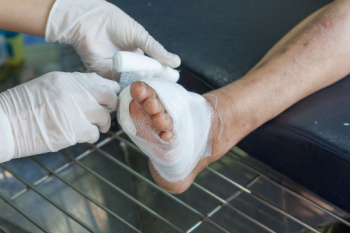 Diabetic foot ulcers are open sores or wounds that commonly occur on the feet of individuals with diabetes. They generally result from a combination of neuropathy, poor circulation, and immune system impairment. Neuropathy causes a loss of sensation, leading to unnoticed injuries. Poor circulation hinders healing, while immune dysfunction makes infections more likely. These ulcers can become severe, leading to complications such as infections, gangrene, or even amputations if left untreated. Management of diabetic foot ulcers includes comprehensive wound care, infection control, and addressing underlying conditions. Regular cleaning and debridement to remove dead tissue can promote healing. Antibiotics may be prescribed to combat infection. Additionally, offloading techniques, such as specialized footwear or orthotics, help reduce pressure on the ulcer. Controlling blood sugar levels is imperative to generate healing and prevent recurrence. Regular monitoring and care are essential for effective management. If you have diabetic foot ulcers, it is strongly suggested that you visit a podiatrist for personalized treatment and prevention strategies.
Diabetic foot ulcers are open sores or wounds that commonly occur on the feet of individuals with diabetes. They generally result from a combination of neuropathy, poor circulation, and immune system impairment. Neuropathy causes a loss of sensation, leading to unnoticed injuries. Poor circulation hinders healing, while immune dysfunction makes infections more likely. These ulcers can become severe, leading to complications such as infections, gangrene, or even amputations if left untreated. Management of diabetic foot ulcers includes comprehensive wound care, infection control, and addressing underlying conditions. Regular cleaning and debridement to remove dead tissue can promote healing. Antibiotics may be prescribed to combat infection. Additionally, offloading techniques, such as specialized footwear or orthotics, help reduce pressure on the ulcer. Controlling blood sugar levels is imperative to generate healing and prevent recurrence. Regular monitoring and care are essential for effective management. If you have diabetic foot ulcers, it is strongly suggested that you visit a podiatrist for personalized treatment and prevention strategies.
Wound care is an important part in dealing with diabetes. If you have diabetes and a foot wound or would like more information about wound care for diabetics, consult with one of our podiatrists from Lovely Foot Associates, PC. Our doctors will assess your condition and provide you with quality foot and ankle treatment.
What Is Wound Care?
Wound care is the practice of taking proper care of a wound. This can range from the smallest to the largest of wounds. While everyone can benefit from proper wound care, it is much more important for diabetics. Diabetics often suffer from poor blood circulation which causes wounds to heal much slower than they would in a non-diabetic.
What Is the Importance of Wound Care?
While it may not seem apparent with small ulcers on the foot, for diabetics, any size ulcer can become infected. Diabetics often also suffer from neuropathy, or nerve loss. This means they might not even feel when they have an ulcer on their foot. If the wound becomes severely infected, amputation may be necessary. Therefore, it is of the upmost importance to properly care for any and all foot wounds.
How to Care for Wounds
The best way to care for foot wounds is to prevent them. For diabetics, this means daily inspections of the feet for any signs of abnormalities or ulcers. It is also recommended to see a podiatrist several times a year for a foot inspection. If you do have an ulcer, run the wound under water to clear dirt from the wound; then apply antibiotic ointment to the wound and cover with a bandage. Bandages should be changed daily and keeping pressure off the wound is smart. It is advised to see a podiatrist, who can keep an eye on it.
If you have any questions, please feel free to contact our office located in Johnstown, PA . We offer the newest diagnostic and treatment technologies for all your foot care needs.